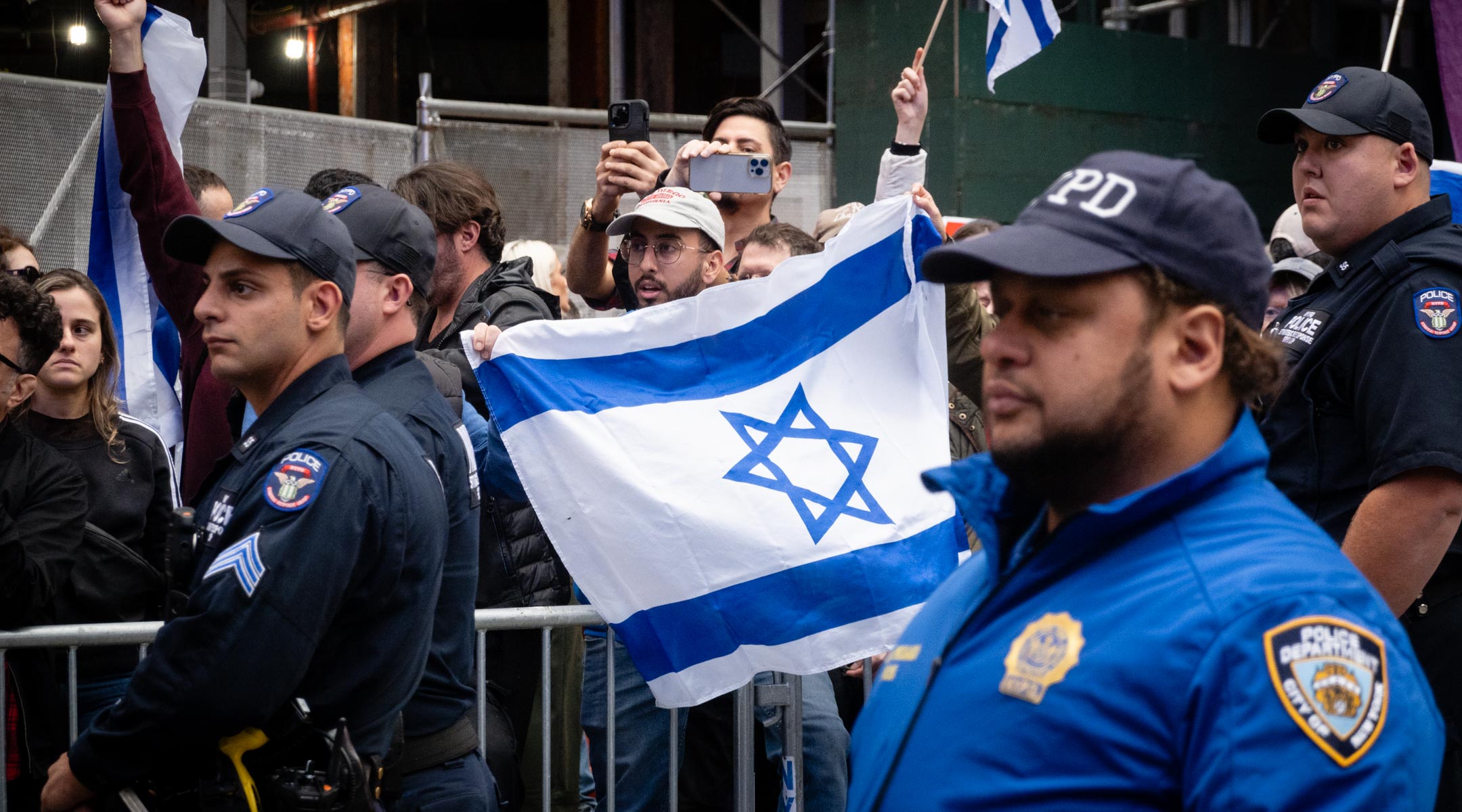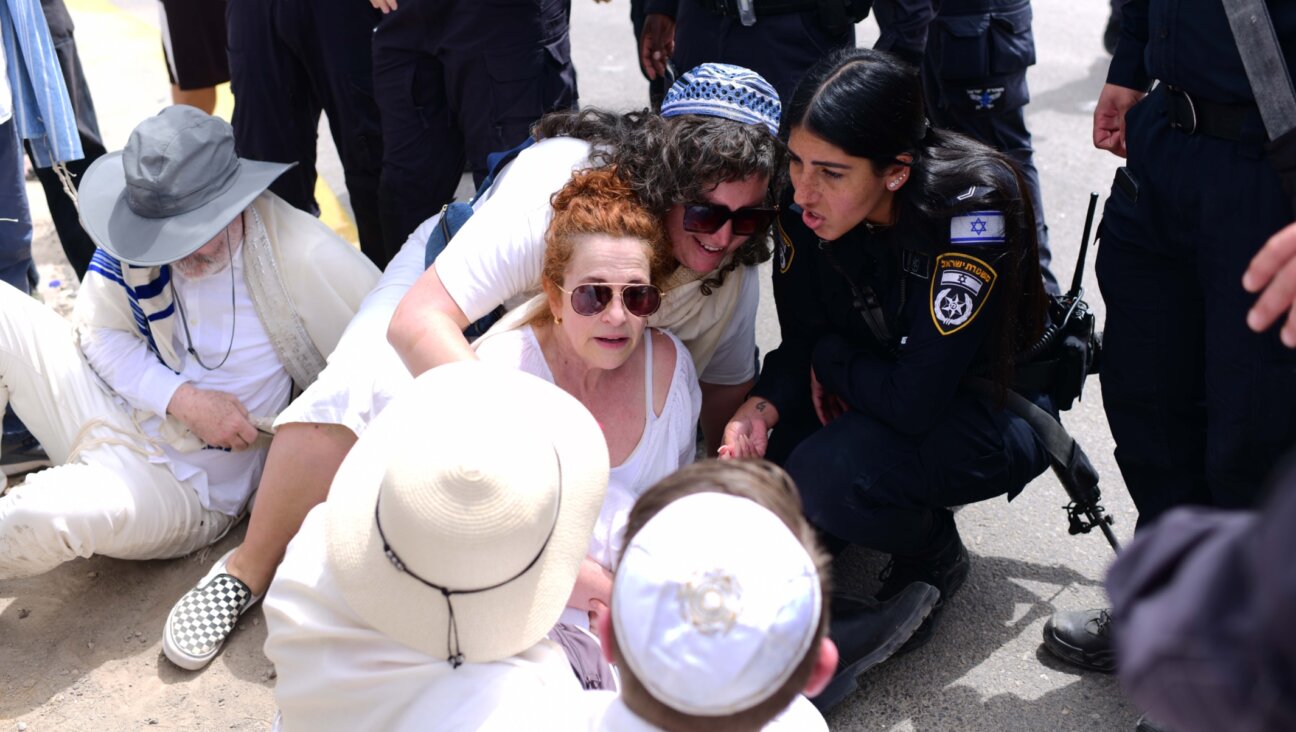Antisemitic incidents have spiked in New York since Hamas attack on Israel, NYPD says

Police protect a group of Israeli and Jewish protesters in New York City, October 8, 2023. (Luke Tress)
(New York Jewish Week) – The day Hamas attacked Israel, two young men shoved a Jewish boy to the ground in Brooklyn. In Rockland County, an assailant fired a BB gun at two women on their way to synagogue. The following day, three Jewish men were shot with a BB gun in Brooklyn.
Those attacks came amid what, according to the NYPD and a regional Jewish security agency, is a spike in antisemitic incidents since Hamas’ Oct. 7 invasion of Israel and Israel’s ensuing war against the terror group in Gaza. It parallels what the Anti-Defamation League says is a nationwide spike in antisemitism in the same period.
On Monday, NYPD data provided to the New York Jewish Week indicated there were 33 antisemitic hate crimes in the first three weeks of October, already surpassing the monthly average of 18 so far this year. Jewish security groups say many antisemitic incidents go unreported.
“The world is different from what it was on Oct. 6,” Mitch Silber, director of the Community Security Initiative, which coordinates security for Jewish institutions in the New York City area, told the New York Jewish Week. “Everyone should be concerned.”
Silber’s group tallied 23 antisemitic incidents in the greater New York area from Oct. 7 to 19. The total in that 12-day period is around double the rate compared to the same time last year, when the Community Security Initiative tallied 20 incidents throughout the entire month of October.
The incidents range from subway graffiti saying “kill the Jews” in Manhattan to violence and harassment. The group has tallied at least nine instances of reported assault. The Community Security Initiative receives reports from individuals, checks into news reports of attacks with law enforcement, and learns about some incidents from the ADL.
In some of the other attacks, an Israeli student was hit with a stick at Columbia University, an assailant shoved an identifiably Jewish woman in Manhattan while shouting, “This pig has got to go,” and a man punched a woman in a Manhattan subway station, saying it was because she was Jewish. A banner at the Stephen Wise Free Synagogue was vandalized with the words, “F—in k—s” and the 2nd Avenue Deli was defaced with a swastika. The targets include all manner of Jews and Israelis, Silber said.
Other incidents related directly to the war in Israel and Gaza, such as vandals scrawling “Globalize the intifada” on a pole in Brooklyn, or Jewish groups receiving threats related to Israel’s conduct. The attacks reported by the Community Security Initiative come alongside a spike in antisemitic rhetoric online and particularly on platforms favored by extremists, according to the ADL.
There have been 196 total antisemitic incidents reported to police since the start of the 2023, the NYPD said. Jews have been, by far, the most frequent target of hate crimes in the city this year.
This year’s total represents a slight decrease from the same period in 2022, following a surge in antisemitism in 2021 related to the Israel-Hamas conflict that year. But there have been fewer serious physical attacks during this conflict than there were during the 2021 fighting, Silber said. He credited the police with stringent enforcement during and after protests, which were a locus of violence in 2021.
Some pro-Palestinian activists who attacked Jews that year have also been sentenced to prison for hate crimes, which may have dissuaded other assailants. Court proceedings surrounding one of the most prominent 2021 attacks, the assault of Joey Borgen, are wrapping up this month, and may be fresh in the minds of would-be attackers, Silber said.
The Community Security Initiative has received hundreds of requests from schools, synagogues and other Jewish institutions for additional security, stretching the resources of security groups and police.
Richard Priem, the deputy national director of the Community Security Service, which trains volunteers to patrol synagogues, said his group has noticed an uptick in suspicious activity around synagogues, although the motive of that activity is not always clear. In the week after Oct. 7, the group received 40 reports of suspicious or antisemitic activity in the U.S., mostly in the New York region, more than double the normal rate.
He urged vigilance but said Jews should continue community activities.
“It could be that they’re planning something, it could be a coincidence,” he said. “It could be antisemitic.”
This article originally appeared on JTA.org.

I hope you appreciated this article. Before you go, I’d like to ask you to please support the Forward’s award-winning journalism this Passover.
In this age of misinformation, our work is needed like never before. We report on the news that matters most to American Jews, driven by truth, not ideology.
At a time when newsrooms are closing or cutting back, the Forward has removed its paywall. That means for the first time in our 126-year history, Forward journalism is free to everyone, everywhere. With an ongoing war, rising antisemitism, and a flood of disinformation that may affect the upcoming election, we believe that free and open access to Jewish journalism is imperative.
Readers like you make it all possible. Right now, we’re in the middle of our Passover Pledge Drive and we still need 300 people to step up and make a gift to sustain our trustworthy, independent journalism.
Make a gift of any size and become a Forward member today. You’ll support our mission to tell the American Jewish story fully and fairly.
— Rachel Fishman Feddersen, Publisher and CEO
Join our mission to tell the Jewish story fully and fairly.
Only 300 more gifts needed by April 30






















